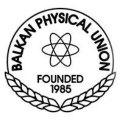Speaker
Description
Leukemia is the most common type of cancer found in children. It accounts for around 33% of all malignant diseases in pediatrics.
Differential scanning calorimetry DSC is a highly sensitive technique that measures temperature-induced conformation changes in proteins. As such, it is useful in measuring the exact values of concentration, conformation and interaction between proteins and other molecules and allows for observing specific insignificant changes in blood plasma and CSF (cerebrospinal fluid), related to various pathological processes. This way, plasma and CSF proteins could serve as biomarkers for the diagnosis and monitoring of the disease.
In this study we have used DSC to compare alterations in the protein thermal denaturation profiles of blood plasma and CSF, taken from children with acute lymphoblastic leukemia (ALL), with the corresponding fluids from other children in continuous remission with healthy clinical and hematological statuses, used as controls.
Here we present DSC measurements of blood plasma in children in cases with leukemic infiltration present in the bone marrow. In some cases they are about newly developed disease or relapsed one, and in other cases about Non-Hodgkin's lymphoma with secondary spread to the bone marrow and also lymphoid blast crisis of chronic myeloid leukemia. The results we have obtained reveal that in the early stages of leukemia development in the bone marrow, the reaction of the plasma proteome is relatively weak – the recorded denaturation profiles do not differ significantly from those of the controls. However, in the course of the disease progression huge differences were found in the state of the plasma proteins. We have found that at least three of the main protein components of blood plasma have specific shifts in their denaturation curves, namely, albumin, with shift from ~62ºC to ~64ºC, globulins Ig, with shift from ~70ºC to ~72ºC, and transferrin, which undergoes denaturation at ~82ºC is shifted to ~ 3ºC, while fibrinogen at ~50ºC is not affected.
In the second group of studies we have presented results from DSC analysis of CSF from children with meningeal relapse of ACC. In one of the patients a high intensity specific peak at ~72ºC was observed in the CSF thermogram (probably caused by the presence of lymphocytic proteins in the CSF) which flattens after negating the neoplastic pleocytosis. In another patient were observed two specific peaks, at ~52ºC and ~68ºC were observed, which decrease in intensity after applied therapy, later we found different CSF protein peaks at ~65ºC and ~83ºC. Changes in the thermograms persist even when a minimum amount of pathological proteins is present. The denaturation profile of a CSF can be used as an indicator for the presence of a blast invasion in the CSF and for measuring the achieved therapeutic effect.
This study contributes to the validation of DSC as a powerful tool for monitoring malignant diseases and for evaluating the efficacy of applied chemotherapy.
Acknowledgements: Support of the Medical University – Sofia, Bulgaria, research project entry №7430/19-11-21, contract № Д-140/14-06-2022, GRANT 22, to the Medical Sciences Council of Medical University - Sofia.

